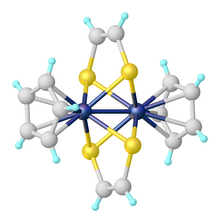Mary Rakowski DuBois
Mary Rakowski DuBois | |
|---|---|
| Born | Mary Clare Rakowski 1946 (age 77–78) |
| Alma mater | Creighton University B.S. (1970) Ohio State University Ph.D. (1974) |
| Spouse | Daniel L. DuBois |
| Scientific career | |
| Institutions | Pacific Northwest National Laboratory (2007-2011) University of Colorado at Boulder (1976-2007) |
| Thesis | Complexes with macrocyclic ligands: I. The oxydation reduction behavior of iron complexes. II. Synthesis and characterization of transition metal containing a pentadentate ligand (1974) |
| Doctoral advisor | Daryle H. Busch |
| Other academic advisors | Earl Muetterties |
Mary Rakowski DuBois is an inorganic chemist, now retired from Pacific Northwest National Laboratory (PNNL). She made multiple contributions to inorganic and organometallic chemistry, focusing on synthetic and mechanistic studies. In recognition of her scientific contributions, she received several awards.
Education and career
[edit]Rakowski DuBois conducted her undergraduate training at Creighton University, receiving her B.S. in 1970.[1] She earned her Ph.D. in 1974 under the mentorship of Daryle H. Busch at Ohio State University,[2] and then was a postdoctoral fellow with Earl Muetterties at Cornell University.[1]
She joined the faculty of the University of Colorado at Boulder in 1976, and was a professor there until 2007, where she moved to Pacific Northwest National Laboratory (PNNL).[3] She retired from PNNL in 2011.[4]
Research
[edit]Together with her husband Daniel L. DuBois, Rakowski DuBois led a team that elucidated the reactivity of nickel complexes of P2N2 ligands, which were popularized at PNNL. The behavior of these complexes highlighted the strong influence of the second coordination sphere on the rates of activation of H2 by 16-electron nickel complexes.[5]

Early in her independent career, while on the faculty at the University of Colorado, she discovered that organomolybdenum sulfides activated hydrogen. This work provided a mechanistic connection between the Mo-S catalysts used in hydrodesulfurization and molecular organometallic chemistry.[1]
Awards
[edit]Rakowski DuBois has been honored with fellowships from Alfred P. Sloan (1981), Dreyfus (1981), and Guggenheim Foundations (1984).[1][7]
References
[edit]- ^ a b c d Rakowski DuBois, M. (1989). "Catalytic Applications of Transition-Metal Complexes with Sulfide Ligands". Chemical Reviews. 89: 1–9. doi:10.1021/cr00091a001.
- ^ Rakowski, Mary Clare (1974). Complexes with macrocyclic ligands: I. The oxydation reduction behavior of iron complexes. II. Synthesis and characterization of transition metal containing a pentadentate ligand (Thesis). The Ohio State University. OCLC 973332814.
- ^ Rakowski Dubois, M.; Dubois, Daniel L. (2009-12-21). "Development of Molecular Electrocatalysts for CO2 Reduction and H2 Production/Oxidation". Accounts of Chemical Research. 42 (12): 1974–1982. doi:10.1021/ar900110c. ISSN 0001-4842. PMID 19645445.
- ^ "PNNL: Center for Molecular Electrocatalysis - Research: Reaching Out to the Next Generation of Scientist - Salmon Summit". efrc.pnnl.gov. Retrieved 2021-06-08.
- ^ Rakowski DuBois, M.; D. L. DuBois (2009). "The Roles of the First And Second Coordination Spheres in the Design of Molecular Catalysts for H2 Production and Oxidation". Chem. Soc. Rev. 38 (1): 62–72. doi:10.1039/b801197b. PMID 19088965.
- ^ Warren K. Miller; R. C. Haltiwanger; M. C. VanDerveer; M. Rokowski DuBois (1983). "Syntheses and Structures of New Molybdenum Complexes with Dithiobenzoate and Dimercaptotoluene ligands. Structural Comparisons in a Series of Dithiolate-Bridged Dimers of Molybdenum(III)". Inorganic Chemistry. 22 (21): 2973–2979. doi:10.1021/ic00163a001.
- ^ "John Simon Guggenheim Foundation | Mary Rakowski DuBois". Retrieved 2021-06-08.
- American inorganic chemists
- 20th-century American chemists
- 21st-century American chemists
- American women chemists
- Creighton University alumni
- Ohio State University alumni
- University of Colorado Boulder faculty
- 20th-century American women scientists
- 21st-century American women scientists
- Living people
- American women academics
- 1946 births
- American chemist stubs
